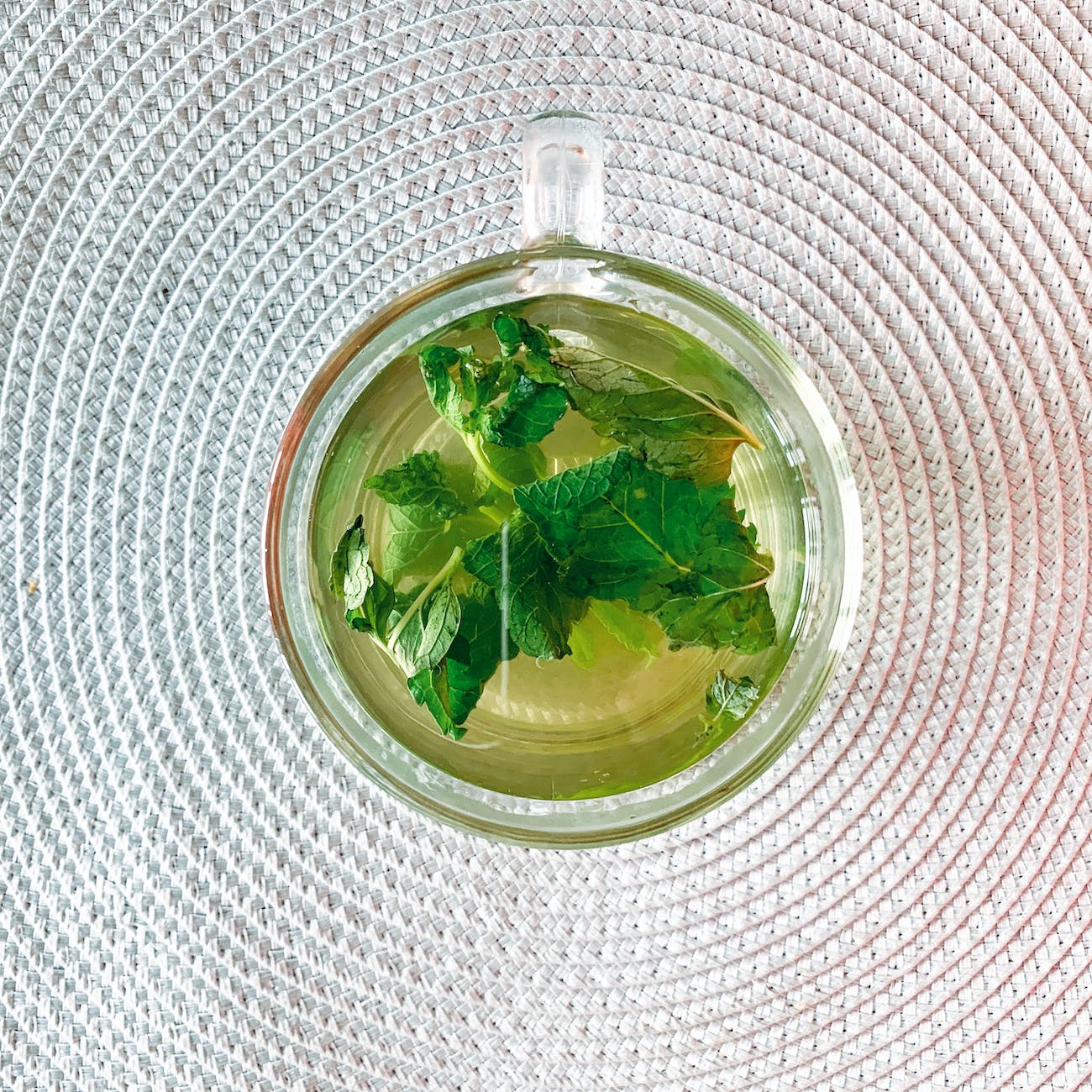If you like mint tea, read on to discover all the health benefits of this energizing beverage.
The revitalizing tea helps improve digestion, boost mood, and more.
Many people worldwide love mint tea for its energizing flavor and calming aroma. It is a delicious and refreshing beverage. This infusion, which comes from the fragrant mint plant, not only entices the senses but also has several possible health advantages, including improving digestion and relieving cold symptoms.
As a broader category of herbs, “mint” actually includes peppermint and spearmint, according to Melissa Azzaro, RDN, a registered dietitian nutritionist in New Hampshire. You may add mint to dishes like this for Lemon, Mint, and White Bean Dip. However, it may also be used to make tea; all you have to do is steep fresh or dried leaves in boiling water. Mint tea comes in two varieties: iced or heated, sweet or unsweet.

But how beneficial is it to you?
Mint tea’s nutritional profile
Tea with peppermint leaves has almost no calories. The USDA states that mint leaves are a natural source of several important elements. This comprises the vitamins C and A. Because whole mint leaves are a major component of mint tea, it is possible that trace levels of these nutrients are present in the beverage. (That being said, none of these nutrients are thought to be well-present in mint tea.)
According to Azzaro, mint has a high antioxidant content. The one drawback is that, in comparison to steeped mint tea, chewing mint leaves will provide you with more antioxidants.
The menthol component of mint tea is one of its special nutritional qualities. This substance has been connected to a number of health advantages, including the relief of headaches and intestinal problems.
What Your Body Experiences Every Day If You Drink Mint Tea
Advantages of Digestive Health
Because of its menthol content, drinking tea with mint leaves may help with digestion. This organic substance might have antispasmodic properties, which would assist the GI tract’s muscles relax and allow food to pass through your digestive system more quickly and smoothly. According to a 2023 study that was published in Current Pharmaceutical Design, some ingredients in peppermint may benefit people with irritable bowel syndrome who are experiencing digestive distress.
Furthermore, according to Mount Sinai, mint tea increases bile flow, which facilitates better digestion by dissolving lipids. Because of this, drinking mint tea after a meal could be very wise.
Advantages of Respiratory Health
Although there isn’t much data to support the claim that drinking mint tea may harm your respiratory system, Mount Sinai points out that inhaling the component, menthol, which is included in mint tea, may act as a natural decongestant and help break up mucus and phlegm. Additionally, the warm, moisture-rich qualities of mint tea will ease sore throats and dry coughs, offering some momentary relief when you’re sick.
Advantages of Mental Health
Recent research published in the Journal of Pharmacy & Pharmacology in 2021 reveals that the menthol present in mint tea may have a calming impact that promotes relaxation and a reduction in tension. Mint tea is also supposed to stimulate the brain, enhancing concentration and cognitive abilities. It’s a natural substitute for coffee that can support sustained mental alertness without causing the jittery negative effects of caffeine. Nevertheless, studies are still needed to prove these advantages, and scientific studies on these benefits are still ongoing.
Benefits of Oral Health
According to Azzaro, sipping mint tea can help you breathe more clearly. Because of its antimicrobial and antifungal properties, mint may benefit dental health. It’s crucial to remember that even though mint tea may improve oral health, frequent brushing, flossing, and dental exams are always necessary.

More research is required to grasp the potential function that mint may play in dental health completely.
Antiviral and Antimicrobial Activities
Interestingly, a 2022 study published in BMC Biology found some preliminary test tube data supporting mint tea’s antiviral efficacy against the COVID-19 virus. But mint tea shouldn’t be used as an infection treatment on its own. It’s important to keep in mind that while these qualities could bolster the body’s defenses, they shouldn’t be used in place of expert medical guidance or care.
Benefits of Hormones
The possible impact of spearmint tea, in particular, on hormone health is another noteworthy feature of mint tea. According to research published in 2020 in the Journal of Ovarian Research, spearmint has been investigated for its anti-androgenic characteristics (androgens are hormones like testosterone), which may be helpful in controlling hormone-related diseases like polycystic ovarian syndrome (PCOS). Since there is little and still no research in this field, taking the tea in place of recommended medical care is not advised. Always get medical advice before adding anything to a hormonal health therapy.
Tips for Preparation and Consumption
To make mint tea, just follow these easy instructions:
Bring water to a boil: First, bring a cup of water to a boil. One cup of water for every serving of tea is a general rule, though the precise amount may vary based on personal liking.
Get the mint ready:
Pick up a handful of fresh mint leaves and set them aside while the water heats. Give them a good rinse with cold running water. You can release more essential oils from the leaves by lightly bruising them, for example, by crumpling them between your fingers, for a stronger mint flavor. Alternatively, you can use a bagged or prepared loose-leaf mint tea.
Allow the tea to steep:
After the water reaches a boiling point, turn off the heat. Put the mint leaves in the boiling water or straight into a tea infuser. Let the tea steep for five to ten minutes or until the desired strength is reached. (If using dried mint tea, steep for approximately five minutes, according to the instructions on the package.)
Pour the tea into a cup;
after straining it, if you drop the leaves straight into the water. If you’d like, you can add sugar or honey to sweeten your mint tea. Savor your homemade mint tea hot or, for a delicious iced tea, let it chill and pour over ice.
Mint tea is pleasant in many different ways. Here are some recommendations:
Warm mint tea: This is how mint tea is traditionally enjoyed. Just pour the newly steeped tea undiluted, letting the aroma and steam generate a calming effect.
Mint tea on ice: Ideal as a coolant on hot days. After steeping the tea for a few hours, let it cool in the fridge and then pour it over ice. To add even more zest, cut up a lemon. Try this Lemon-Mint Green Jasmine Iced Tea.
Mint tea with honey: Stir a tablespoon of honey into your mint tea to make it sweeter. This intensifies the flavor of the mint while also adding a touch of natural sweetness.
Lemon-infused mint tea: To your tea, add a piece of lemon. The mint is complemented by the lemon’s acidity, which adds a zesty and refreshing twist.

Mint tea latte: Consider making a latte out of your mint tea for a creamy twist. After steeping the tea in half the water, pour in your preferred warm milk.
Spiced mint tea: Infuse the newly brewed tea with a dash of your preferred spices, like nutmeg or cinnamon. This adds a cozy, toasty element to your mint tea that is ideal for chilly days.
Common Questions: Is it healthy to have mint tea every day?
For most people, drinking tea on a daily basis is a terrific way to complement a balanced diet, particularly if it takes the place of a sugary beverage (like ordinary soda). Although mint tea is generally seen to be healthy for most people, consuming too much of it could have some unfavorable effects. For example, in certain people, it might result in an allergic reaction or heartburn. Furthermore, consuming excessive amounts of mint tea may make symptoms of gastroesophageal reflux disease worse despite the tea’s calming benefits on the digestive tract (GERD). According to a research update published in the Medeniyet Medical Journal, while mint tea is generally safe to drink during pregnancy, it is advised not to consume excessive amounts in the early stages of pregnancy since it may accelerate menstruation. (In summary, everyone should consume a reasonable amount and discuss any problems or unique medical status with their doctor.)
Does drinking mint tea help you detox?
No single food or beverage can help your body detoxify. But drinking enough water—and drinking mint tea can help—can support healthy kidney function, which will enable the body to excrete pollutants through urine. Maintaining hydration also helps the body eliminate toxins through regular bowel movements.
Is belly fat burned by mint tea?
A single meal or beverage won’t reduce abdominal fat. Eating a balanced diet, exercising frequently, and other lifestyle adjustments like getting enough sleep are all necessary to reduce abdominal fat.
When is it inappropriate to consume mint tea?
Since mint tea doesn’t naturally contain caffeine, you can drink it whenever you want throughout the day without worrying that it will keep you up at night. Moreover, steeping a cup is an excellent idea anytime during the day when you feel like you need a minty pick-me-up.
Is mint tea beneficial to the liver and kidneys?
It’s interesting to note that the National Library of Medicine states that if you already have a liver ailment or renal problem, drinking a lot of spearmint tea may exacerbate your condition. Keep in mind that spearmint tea is not the same as other mints, such as peppermint. Regarding peppermint, Mount Sinai warns that it may cause problems for drugs that the liver metabolizes. It’s beneficial to find out from your doctor or pharmacist if you should cut back on mint tea if you take medication.
To Conclude
Numerous possible health advantages of mint tea include stress reduction and support for the digestive system. It’s important to remember, though, that if you have any medical concerns, you might want to stay away from mint tea, so it’s advisable to consult your doctor first. Other than that, mint tea is a delightful and revitalizing drink that promotes good health. Drink up.
